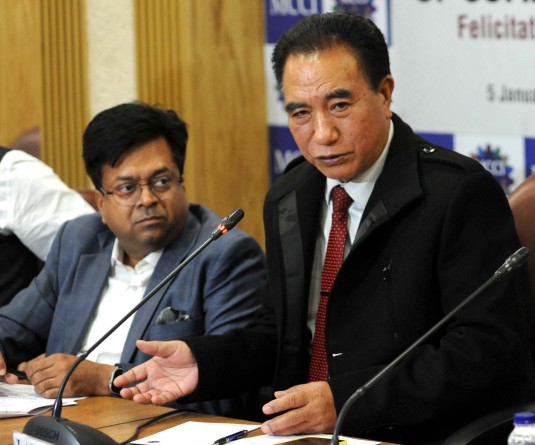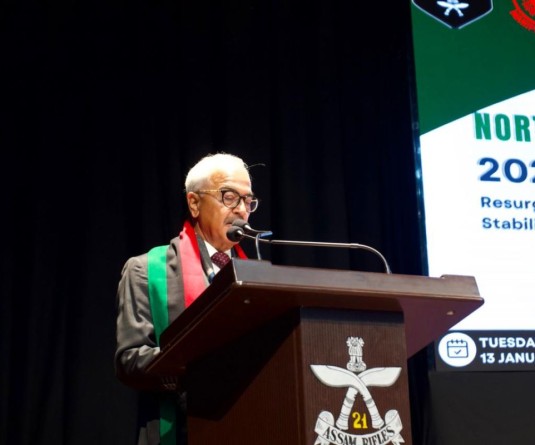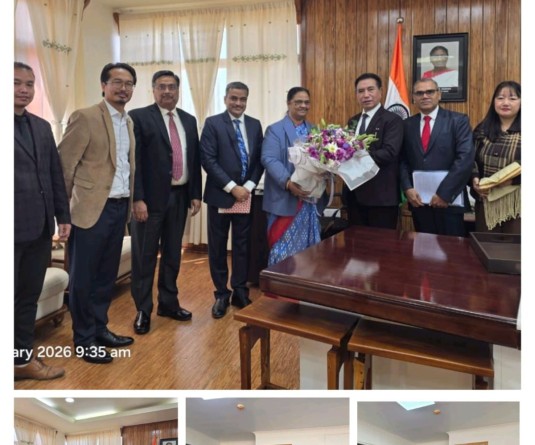
Kohima | October 6 : Health & Family Welfare deputy director Dr. Kika Longkumer asserted that senior citizens are a treasure to our society.
Speaking at the recent International Day of Older Persons here, he said that in our life, our brain doesn’t stop unless we stop using it. It said that the ability of learning is the same age from age 20 to age 60. Irrespective of age we need to continue to think and remain productive. He quoted Kofi Anna as saying “Trees grow stronger over the years, rivers wider. Likewise, with age, human beings gain immeasurable depth and breadth of experience and wisdom. That is why older persons should be not only respected and revered; they should be utilized as the rich resource to society that that are.”
Dr. Kika said that there is immense scope for the senior citizens to give back their vast experience in different ways of life to the society, “because your contribution is the gift of life experience, skill, wisdom and human warmth to other generations.” He added that the youth of today can gain from the experience of the senior citizens in taking the nation to greater heights. Such interactions, he said, will not only create the opportunity to upgrade their knowledge from the youngsters but also keep everyone busy which in turn will help in preventing the consequences of idle mind particularly amongst the youth.
The Deputy Director also stated that senior citizens can be instrumental in documentation preservation and conservation of the history, customs and practices which is traditionally oral based and is fast eroding in the present generation, adding that their vast skill and experience can help in revitalization of traditional values as well as contemporary art and skill. Discoveries in medical science and improved social conditions during the past few decades have increased the life span of man. Presently, elders population constitutes about 8% of the total population in India i.e about 90 million people or 1/8th of the worlds elderly population lives in India and it is projected to reach 21% by 2050. According to the WHO, increasing life expectancy at birth by 10% will increase the economic growth rate by 0.35% a year.
On the other hand, Dr. Kika said, with advancing age, senior citizens have to cope with health and associated problems some of which may be chronic, of a multiple nature, require constant attention and carry the risk of disability and consequent loss of autonomy. Some health programmes, especially when accompanied by impaired functional capacity require long term management of illness and nursing care. Dr. Kika said among older people the most common ailment is non-communicable diseases- visual impairment (88%), Locomotive disorders (Joint & muscles (40%), Neurological (18%), Cardiovascular diseases (17%), Respiratory disorder (16%), hearing impairment, cancers etc. “These disorders require proper and in some cases prolonged treatment. Medical treatments for senior citizens include various cures ranging from allopathic to naturopathy treatments.” Dr. Kika said that an integrated multidisciplinary (health, social, economic and other sectors) and participatory approach is required for issues confronting the elderly. Facilitation of productive ageing requires a spectrum comprising of social commitments, family care, financial support, policies and welfare schemes in addition to promotive, preventive, protective and curative health services.
In addition to various health care services provided through the public health institutions, there is also special packages for the senior citizens viz; 50 % concession in all investigations such as x-ray, ultrasound, paying cabin charges etc. as well as surgical producers wherever the same is charged, free OPD registration for senior citizens, recipients of old age persons and senior citizens are provided priority attention for registration and OPD services, and special senior citizens clinic being held in all district hospitals once a month. The key to cure for many ailments is early detection and prompt treatment. For instance; cataract which is a problem of ageing is responsible for 62% of blindness. Such blindness is preventable with timely detection and treatment. EDPT of early cancer and precancerous conditions provided the best protection against cancer for the individual and the community. Likewise, early detection and treatment of high blood pressure would produce a large reduction in the incidence of cardiovascular diseases complications.
Speaking at the recent International Day of Older Persons here, he said that in our life, our brain doesn’t stop unless we stop using it. It said that the ability of learning is the same age from age 20 to age 60. Irrespective of age we need to continue to think and remain productive. He quoted Kofi Anna as saying “Trees grow stronger over the years, rivers wider. Likewise, with age, human beings gain immeasurable depth and breadth of experience and wisdom. That is why older persons should be not only respected and revered; they should be utilized as the rich resource to society that that are.”
Dr. Kika said that there is immense scope for the senior citizens to give back their vast experience in different ways of life to the society, “because your contribution is the gift of life experience, skill, wisdom and human warmth to other generations.” He added that the youth of today can gain from the experience of the senior citizens in taking the nation to greater heights. Such interactions, he said, will not only create the opportunity to upgrade their knowledge from the youngsters but also keep everyone busy which in turn will help in preventing the consequences of idle mind particularly amongst the youth.
The Deputy Director also stated that senior citizens can be instrumental in documentation preservation and conservation of the history, customs and practices which is traditionally oral based and is fast eroding in the present generation, adding that their vast skill and experience can help in revitalization of traditional values as well as contemporary art and skill. Discoveries in medical science and improved social conditions during the past few decades have increased the life span of man. Presently, elders population constitutes about 8% of the total population in India i.e about 90 million people or 1/8th of the worlds elderly population lives in India and it is projected to reach 21% by 2050. According to the WHO, increasing life expectancy at birth by 10% will increase the economic growth rate by 0.35% a year.
On the other hand, Dr. Kika said, with advancing age, senior citizens have to cope with health and associated problems some of which may be chronic, of a multiple nature, require constant attention and carry the risk of disability and consequent loss of autonomy. Some health programmes, especially when accompanied by impaired functional capacity require long term management of illness and nursing care. Dr. Kika said among older people the most common ailment is non-communicable diseases- visual impairment (88%), Locomotive disorders (Joint & muscles (40%), Neurological (18%), Cardiovascular diseases (17%), Respiratory disorder (16%), hearing impairment, cancers etc. “These disorders require proper and in some cases prolonged treatment. Medical treatments for senior citizens include various cures ranging from allopathic to naturopathy treatments.” Dr. Kika said that an integrated multidisciplinary (health, social, economic and other sectors) and participatory approach is required for issues confronting the elderly. Facilitation of productive ageing requires a spectrum comprising of social commitments, family care, financial support, policies and welfare schemes in addition to promotive, preventive, protective and curative health services.
In addition to various health care services provided through the public health institutions, there is also special packages for the senior citizens viz; 50 % concession in all investigations such as x-ray, ultrasound, paying cabin charges etc. as well as surgical producers wherever the same is charged, free OPD registration for senior citizens, recipients of old age persons and senior citizens are provided priority attention for registration and OPD services, and special senior citizens clinic being held in all district hospitals once a month. The key to cure for many ailments is early detection and prompt treatment. For instance; cataract which is a problem of ageing is responsible for 62% of blindness. Such blindness is preventable with timely detection and treatment. EDPT of early cancer and precancerous conditions provided the best protection against cancer for the individual and the community. Likewise, early detection and treatment of high blood pressure would produce a large reduction in the incidence of cardiovascular diseases complications.






